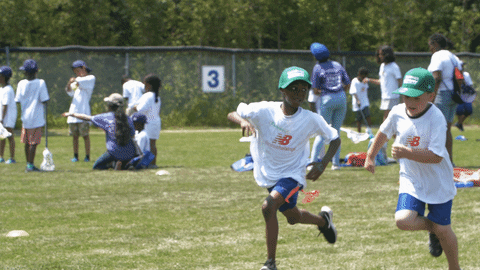Experts Agree: Let Your Kids Play Already!
Unstructured playtime has been dwindling significantly since the '80s. Giphy
Giphy
News that is entertaining to read
Subscribe for free to get more stories like this directly to your inboxThere’s no shortage of social media memes comparing today’s kids to those of previous generations. Many of them focus on the fact that parents of Generation X children allowed them to run free and explore while subsequent generations of kids have been largely sheltered.
As it turns out, there’s a lot of truth to that perception — and the trend appears to be detrimental to children.
Reasons for the shift
Almost any worried parent has felt the desire to protect their kids at all costs. And with the rise of sensationalized stories about kidnappings and other horrors, it’s only natural that parents would respond by limiting unsupervised play.
Plenty of other issues, from longer school years to the proliferation of electronic devices, have also added to a society in which kids simply don’t have the same freedom to explore and play without the direct supervision of an adult.
None of this is meant to disparage the well-intentioned parents out there who are just trying to keep their children safe. But by understanding the pros and cons of limiting “free play,” it’ll be easier to make the best choices for kids’ mental, emotional, and physical health.
Disorganization is good
As we get older, there are plenty of reasons that it pays to be organized. But as a child, there’s an inherent value in unstructured playtime. But over the past several decades, this has been largely replaced by activities that involve clear rules and boundaries, thus limiting the imagination that children are hard-wired to develop.
Between 1981 and 1997, studies show that unstructured playtime without parental involvement declined by a staggering 25%. Since then, technology and other issues have only exacerbated the situation.
It’s resulted in kids who have fewer friends, spend less time outdoors, and even struggle with delayed motor skills.
 Why Is The Aging Voyager 1 Probe Sending Back Incoherent Communications?
It's been speaking gibberish for a few months and officials are concerned.
Why Is The Aging Voyager 1 Probe Sending Back Incoherent Communications?
It's been speaking gibberish for a few months and officials are concerned. One Woman’s Massive Donation Is Wiping Out Tuition At This Medical School
Her inheritance came with the instruction to do "whatever you think is right."
One Woman’s Massive Donation Is Wiping Out Tuition At This Medical School
Her inheritance came with the instruction to do "whatever you think is right." Woman’s Pets Will Inherit Her Multimillion-Dollar Fortune, Not Her Kids
It's not the first time four-legged heirs were named in a will.
Woman’s Pets Will Inherit Her Multimillion-Dollar Fortune, Not Her Kids
It's not the first time four-legged heirs were named in a will.